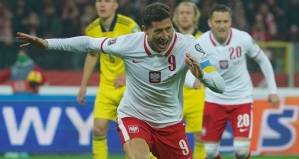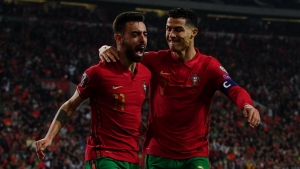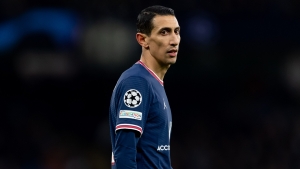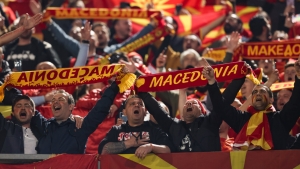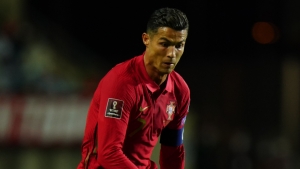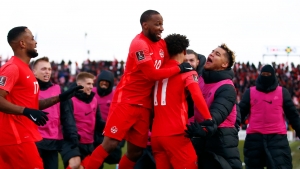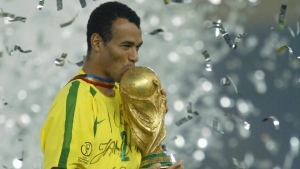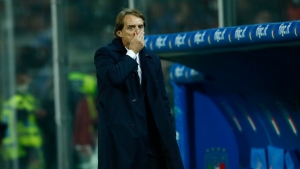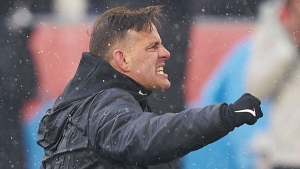It's almost taken for granted that the best players in football appear at the biggest tournament of them all, the World Cup.
But look a little closer, and we can see that is just not the case. Every four years there are a handful of big names who miss out, usually those born to countries without the same footballing pedigree as the likes of Brazil, Argentina and Spain.
There are even countless greats who, down the years, have failed to register a single appearance at a World Cup finals. Either they've been something of an anomaly in terms of the quality available to their country at a given time, injury has struck, or the coach simply hasn't picked them. Alfredo di Stefano, Ryan Giggs, George Best, Eric Cantona all enjoyed illustrious careers without playing in a World Cup.
Cristiano Ronaldo, Zlatan Ibrahimovic and Robert Lewandowski have at least all appeared at previous editions of the tournament, so this week's qualifying climax in Europe isn't exactly the only opportunity they have to ensure they represent their respective countries on the grandest stage.
But, given their ages, it has to be considered likely that Qatar 2022 will be the last World Cup at which any of them appear.
Waiting to make their mark
Ibrahimovic and Lewandowski have, obviously, enjoyed incredible careers. At club and international level, both have titles and records practically coming out of their ears.
Lewandowski already has more caps (128) and goals (74) for Poland than anyone else ever, while Ibrahimovic is Sweden's all-time top scorer (62).
Historically, both strikers are their respective nations' most-recognisable footballers, and surely the most talented they've ever produced.
Yet, one cannot say either of them has ever caused much of a stir at a World Cup.
Of course, neither Ibrahimovic nor Lewandowski has ever played in a senior international team that would be considered a challenger for major honours – in fact, each of them has only ever featured at one World Cup.
Ibrahimovic was a part of the Sweden team that got to the last 16 of the 2006 edition, while Lewandowski made his World Cup bow four years ago in Russia.
Sweden coach Janne Andersson opted against offering Ibrahimovic a way out of international retirement ahead of the 2018 World Cup, but he did eventually return in March last year. He will be 41 by the time Qatar 2022 comes around in November.
Lewandowski will be 34, so it's by no means outside the realm of possibility that he'll make an appearance in 2026, particularly if we look at Ibrahimovic's longevity.
But there won't be room for both of them in Qatar. Tuesday's play-off final in Chorzow pits Poland and Sweden against each other for the right to secure passage to the finals and what could be a last World Cup appearance for one of these two all-time greats.
No one will be expecting Sweden or Poland to go deep into the tournament, given neither has been beyond the last eight since 1994. But it would seem a travesty if players as good as Lewandowski and Ibrahimovic never managed to score at a World Cup.
Primed for World Cup number five, unless…
While Ibrahimovic and Lewandowski are still waiting to make a memorable impact at a World Cup, Ronaldo will be featuring at a fifth assuming he and Portugal qualify.
Ronaldo first appeared at the 2006 World Cup, something few England fans will forget given his role in Wayne Rooney's sending-off during their quarter-final tussle. Portugal went on to win 3-1 on penalties after a 0-0 draw, with Ronaldo netting the decisive spot-kick.
They finished fourth that year, but in the three tournaments since, Portugal haven't got beyond the last 16.
While Portugal's success at Euro 2016 means Ronaldo should never have his international legacy questioned in future, that World Cup record must be something he is keen to improve.
Additionally, Qatar 2022 looks likely to be the last time a certain rivalry can dominate headlines in a major tournament.
Lionel Messi has already helped Argentina secure a place and, given their 30-match unbeaten run and the fact they head to Qatar as South American champions, there's every reason to expect La Albiceleste will be an entirely different proposition compared to the team at Russia 2018.
While Messi and Ronaldo have shown signs of decline this term at club level, they remain fundamental for their respective national teams – but this surely won't be the case in 2026.
Qatar 2022 should offer Ronaldo the chance to boost his World Cup goals record of seven in 17 games. While by no means poor, a player of such self-belief will surely be aiming for more.
Those leading the way appear out of reach, barring an utterly freak showing from Ronaldo. Miroslav Klose (16) holds the record for most World Cup goals, while the 'other/original/Brazilian' Ronaldo is just behind on 15. Then there are other greats Gerd Muller (14), Just Fontaine (13) and Pele (12).
Reaching double figures would seem a realistic target and at least put him in great company, with only 13 players reaching 10 World Cup goals in the tournament's history.
Similarly, that would also make him Portugal's most-prolific World Cup player, with Eusebio currently holding that record thanks to his nine strikes, all of which came in 1966.
Of course, it's by no means a given that Ronaldo or Portugal will make it. Up next for them on Tuesday in their play-off final are North Macedonia.
Fernando Santos' side will undoubtedly favour themselves, but North Macedonia have already shocked European champions Italy – who's to say they can't stun Portugal as well?





















